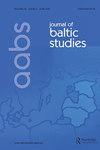《赫尔辛基公约》的农业养分管理:国内机构的重要性
IF 0.5
4区 社会学
Q2 AREA STUDIES
引用次数: 1
摘要
国家政策风格和路径依赖性正在影响波罗的海国家履行《赫尔辛基公约》承诺的能力。本文综合了与农业营养管理条款有关的研究的证据和见解,农业营养管理是海洋污染的主要来源。我们认为,纵向高度集中而横向分散的政府缺乏能力,包括在能够利用执行的非正式机构方面。作为对可持续发展的体制障碍的评估,我们的分析对与波罗的海相关国家达成的其他国际协议具有更广泛的相关性。本文章由计算机程序翻译,如有差异,请以英文原文为准。
The Helsinki Convention’s agricultural nutrient governance: how domestic institutions matter
ABSTRACT National policy styles and path-dependencies are affecting the abilities of Baltic Sea countries to deliver on their commitments under the Helsinki Convention. This article synthesizes evidence and insights from studies relating to the provisions on agricultural nutrient management, a main source of marine pollution. We contend that governments that are strongly concentrated vertically, while fragmented horizontally, lack capacity including with respect to informal institutions that can leverage implementation. As a stocktaking of institutional impediments to sustainable development, our analysis has wider relevance for other international agreements with Baltic Sea countries involved.
求助全文
通过发布文献求助,成功后即可免费获取论文全文。
去求助
来源期刊

Journal of Baltic Studies
AREA STUDIES-
CiteScore
1.20
自引率
0.00%
发文量
52
期刊介绍:
The Journal of Baltic Studies, the official journal of the Association for the Advancement of Baltic Studies (AABS), is a peer-reviewed, multidisciplinary journal for the purpose of advancing the accumulation of knowledge about all aspects of the Baltic Sea region"s political, social, economic, and cultural life, past and present. Preference is given to original contributions that are of general scholarly interest. The Association for the Advancement of Baltic Studies is an international, educational, and scholarly non-profit organization. Established in 1968, the purpose of the Association is the promotion of research and education in Baltic Studies.
 求助内容:
求助内容: 应助结果提醒方式:
应助结果提醒方式:


